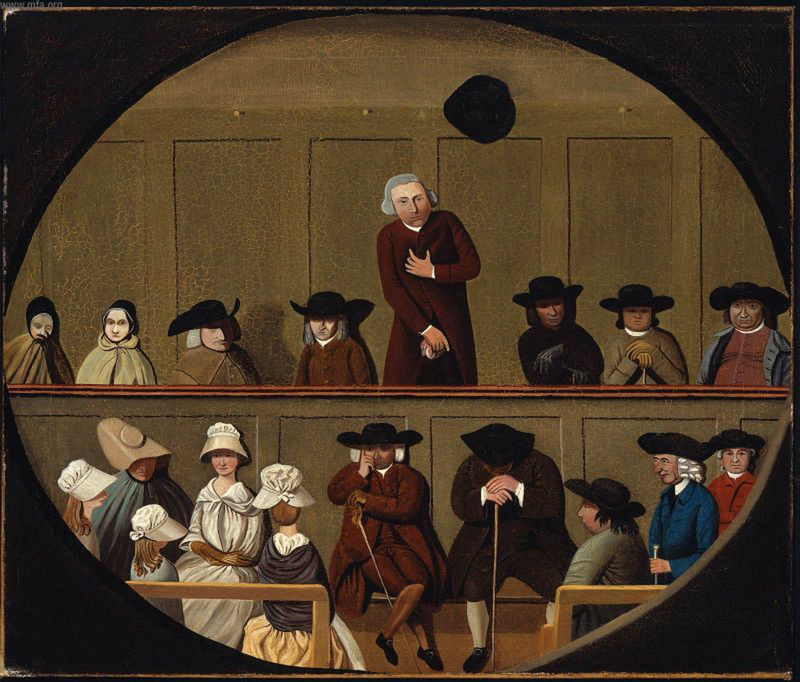
Quaker Meeting
Museum of Fine Arts, Boston, 19th century
My dear friends,
In Matthew 18:15-20, Jesus teaches us the importance of addressing conflict in our spiritual communities with compassion, respect, and truth. He gives us a process for reconciliation that is rooted in care for one another, not in punishment or exclusion. By approaching difficulties with an Awakening Mind of love, compassion and wisdom (Bodhicitta) — the presence of a Holy Spirit in our hearts and minds — these moments of conflict become opportunities for deep spiritual growth and transformation.
go and point out their fault,
just between the two of you.
If they listen to you, you have won them over."
- Matthew 18:15
Here, Jesus instructs us to first approach one another directly, in private. This is not meant to be a confrontation of egos but a loving, compassionate conversation aimed at restoring harmony. The Awakening Mind sees the inherent value in each person, and through the Holy Spirit, we are guided to approach others with a pure heart and a desire to heal relationships. If we come with humility, seeking to understand and to restore, we create space for the other person to respond in kind. This is how genuine reconciliation can begin.
so that every matter may be established by the testimony of two or three witnesses."
- Matthew 18:16
If the first attempt at reconciliation does not bring resolution, Jesus advises us to involve others. In this, we are reminded of the power of community. A loving community serves as a mirror, reflecting truth and compassion. The involvement of witnesses is not about shaming the person but about bringing additional wisdom, love, and perspective to the situation. When approached in this way, the situation can evolve from conflict into an opportunity for collective spiritual growth.
and if they refuse to listen even to the church,
treat them as you would a gentile or a tax collector."
- Matthew 18:17
In the event that reconciliation is still not achieved, Jesus suggests involving the larger spiritual community. This step allows the whole body to come together in love and truth. The instruction to treat the unrepentant as a "gentile or a tax collector" is often misunderstood. In the light of the Awakening Mind, we can recall how Jesus himself treated such individuals—with compassion, patience, and continued invitation to transformation. Rather than seeing this as a directive for exclusion, we see it as an opportunity to extend even deeper compassion while holding firm to the truth.
whatever you bind on earth will be bound in heaven,
and whatever you loose on earth will be loosed in heaven."
- Matthew 18:18
This statement speaks to the profound power of spiritual authority within a community. The decisions we make, the relationships we heal, and the forgiveness we extend all have lasting impact, both in this life and beyond. With the Holy Spirit, the Awakening Mind, guiding our actions, we participate in the unfolding of divine will. We bind and loose not out of our limited perspectives, but from a place of wisdom and compassion, bringing heaven to earth through our actions.
if two of you on earth agree about anything they ask for,
it will be done for them by my Father in heaven.
For where two or three gather in my name, there am I with them."
- Matthew 18:19-20
These final verses remind us of the sacredness of spiritual community. When we come together in the name of Christ—or with the intention of cultivating bodhicitta—the Holy Spirit, the Awakening Mind, is present among us. This presence turns any difficulty, disagreement, or conflict into an opportunity for transformation. Through prayer, meditation, and shared intention, the spiritual power of the community becomes a conduit for divine intervention, healing, and growth. Where two or three are so gathered, the divine is fully present.
In this teaching, Jesus offers us a process for handling conflict that transforms it from a source of division into an opportunity for spiritual deepening. When we are guided by the Holy Spirit, the Awakening Mind, we see that difficulties are not threats to unity but catalysts for greater love, compassion, and wisdom. Let us approach one another with this heart of reconciliation, allowing the divine presence to guide us in every step.